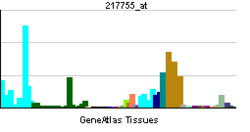HN1 (gene)
Hematological and neurological expressed 1 protein is a protein that in humans is encoded by the HN1 gene.[3][4]
NOTE: HN1 can also refer to the Notch 1 gene.
References
- ↑ "Human PubMed Reference:".
- ↑ "Mouse PubMed Reference:".
- ↑ Zhou G, Wang J, Zhang Y, Zhong C, Ni J, Wang L, Guo J, Zhang K, Yu L, Zhao S (Apr 2004). "Cloning, expression and subcellular localization of HN1 and HN1L genes, as well as characterization of their orthologs, defining an evolutionarily conserved gene family". Gene. 331: 115–23. doi:10.1016/j.gene.2004.02.025. PMID 15094197.
- ↑ "Entrez Gene: HN1 hematological and neurological expressed 1".
Further reading
- Laughlin KM, Luo D, Liu C, Shaw G, Warrington KH Jr, Law BK, Harrison JK (2009). "Hematopoietic- and neurologic-expressed sequence 1 (Hn1) depletion in B16.F10 melanoma cells promotes a differentiated phenotype that includes increased melanogenesis and cell cycle arrest". Differentiation. 78 (1): 35–44. doi:10.1016/j.diff.2009.04.001. PMC 2867035
 . PMID 19427096.
. PMID 19427096.
- Laughlin KM, Luo D, Liu C, Shaw G, Warrington KH Jr, Qiu J, Yachnis AT, Harrison JK (2009). "Hematopoietic- and Neurologic-Expressed Sequence 1 Expression in the Murine GL261 and High-Grade Human Gliomas". Pathol Oncol Res. 15 (3): 437–44. doi:10.1007/s12253-008-9147-4. PMC 2819207
 . PMID 19145478.
. PMID 19145478.
- Zujovic V, Luo D, Baker HV, Lopez MC, Miller KR, Streit WJ, Harrison JK (2005). "The facial motor nucleus transcriptional program in response to peripheral nerve injury identifies Hn1 as a regeneration-associated gene". J Neurosci Res. 82 (5): 581–91. doi:10.1002/jnr.20676. PMID 16267826.
- Olsen JV, Blagoev B, Gnad F, et al. (2006). "Global, in vivo, and site-specific phosphorylation dynamics in signaling networks". Cell. 127 (3): 635–48. doi:10.1016/j.cell.2006.09.026. PMID 17081983.
- Zougman A, Wiśniewski JR (2006). "Beyond linker histones and high mobility group proteins: global profiling of perchloric acid soluble proteins". J. Proteome Res. 5 (4): 925–34. doi:10.1021/pr050415p. PMID 16602700.
- Gerhard DS, Wagner L, Feingold EA, et al. (2004). "The Status, Quality, and Expansion of the NIH Full-Length cDNA Project: The Mammalian Gene Collection (MGC)". Genome Res. 14 (10B): 2121–7. doi:10.1101/gr.2596504. PMC 528928
 . PMID 15489334.
. PMID 15489334.
- Strausberg RL, Feingold EA, Grouse LH, et al. (2003). "Generation and initial analysis of more than 15,000 full-length human and mouse cDNA sequences". Proc. Natl. Acad. Sci. U.S.A. 99 (26): 16899–903. doi:10.1073/pnas.242603899. PMC 139241
 . PMID 12477932.
. PMID 12477932.
- Li D, Gonzalez O, Bachinski LL, Roberts R (2001). "Human protein tyrosine phosphatase-like gene: expression profile, genomic structure, and mutation analysis in families with ARVD". Gene. 256 (1–2): 237–43. doi:10.1016/S0378-1119(00)00347-4. PMID 11054553.
- Suzuki Y, Yoshitomo-Nakagawa K, Maruyama K, et al. (1997). "Construction and characterization of a full length-enriched and a 5'-end-enriched cDNA library". Gene. 200 (1–2): 149–56. doi:10.1016/S0378-1119(97)00411-3. PMID 9373149.
- Maruyama K, Sugano S (1994). "Oligo-capping: a simple method to replace the cap structure of eukaryotic mRNAs with oligoribonucleotides". Gene. 138 (1–2): 171–4. doi:10.1016/0378-1119(94)90802-8. PMID 8125298.

 . PMID 19427096.
. PMID 19427096. . PMID 19145478.
. PMID 19145478. . PMID 15489334.
. PMID 15489334. . PMID 12477932.
. PMID 12477932.